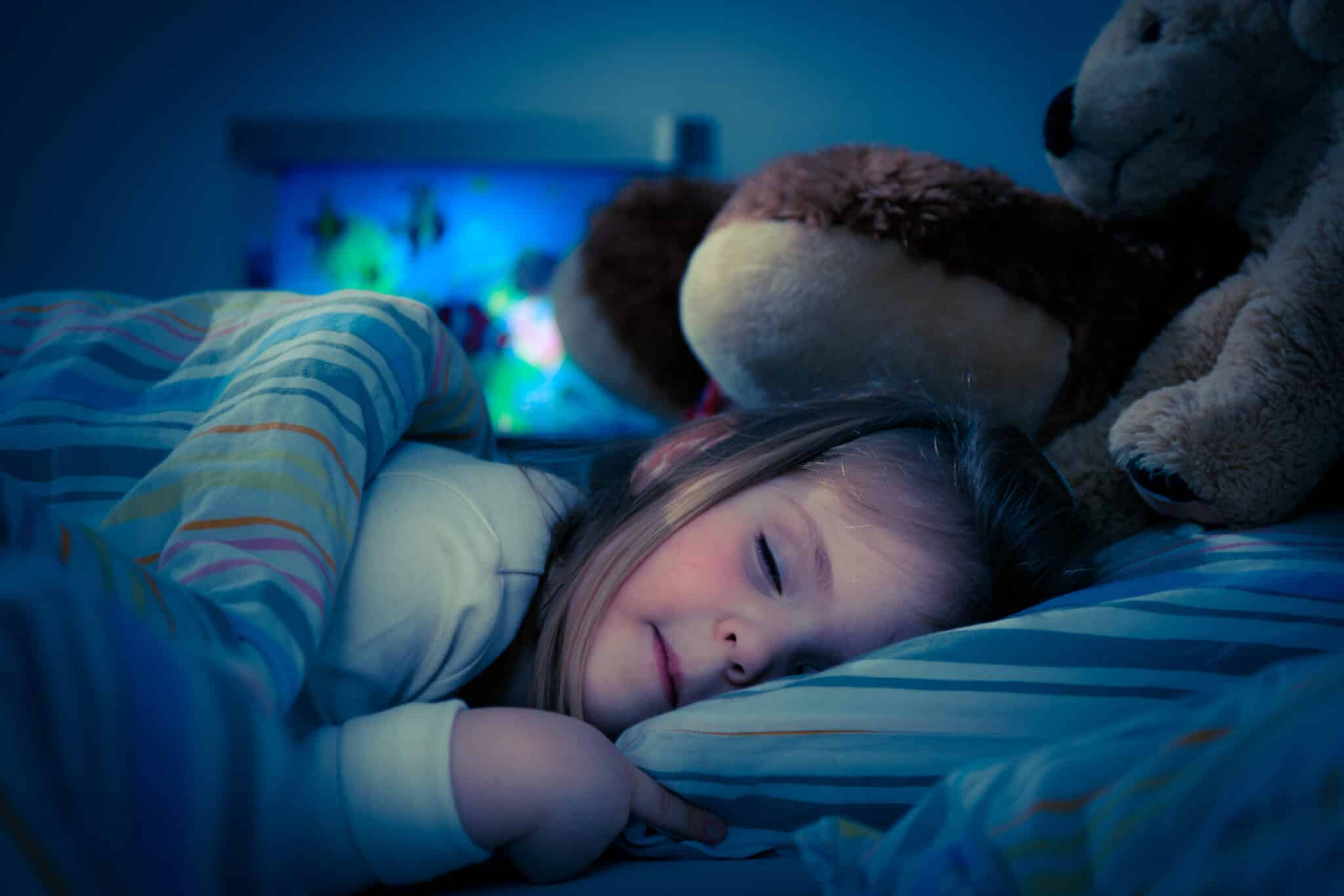
How to Really Deal With
Nightmares in Children
The Bedtime Hero Program for Nighttime Fears
During my career as a child psychiatrist I have helped hundreds of children deal with nightmares and other bedtime fears. The secret lies in strengthening and empowering your child .. something that is not achieved by simple reassurance, night lights or bedtime routines.
In fact, learning how to overcome fear is an important step in developing self-confidence and independence that will spread into all aspects of your child’s life. That's why I created a step-by-step method to help your child learn to sleep alone, free from bad dreams, feeling confident and happy.
But first let me share some information about children's nightmares and bad dreams ..
Children Who Have Bad Dreams or Nightmares
It all started when that mean little girl next door told your child the scary story about Bloody Mary coming out of the mirror at night .. or that kid at school who convinced your child that aliens are real .. or that commercial your child saw about a horror movie .. or your child overhearing some frightening event on the evening news ..
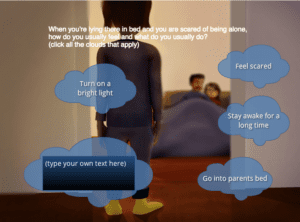
If the frightening image was strong enough or your child’s self-confidence was not up to the challenge, he or she may have developed an ongoing fear of having more scary dreams. Maybe they started to lay awake listening for a robber coming up the stairs or imagining scary things in the shadows of their darkened room.
This is a typical story that I have heard many times in my child psychiatry practice - a child developing a fear of a threatening person or thing, such as a robber, a kidnapper, an alien, a monster, a horror movie figure, etc. I have also heard the frustration and the fatigue in their parents who are losing sleep, losing patience and living with worry about their child who is fearful and not sleeping.
How Common Is It?
Nightmares in children are extremely common. Half of all preschool children are reported to have frequent nightmares, while as many as 1 in 5 children (20%) aged 6 to 12 years have nightmares at least once per week1,2. The majority of all school-aged children have occasional bad dreams3. These are huge numbers! In my opinion, helping children overcome this problem is a major mental health need.
The Goal
The goal is not merely to stop your child from having bad dreams, but for them to feel comfortable, confident and unafraid of sleeping on their own, even if they were to have another bad dream.
Understanding Bad Dreams, Nightmares and Night Terrors
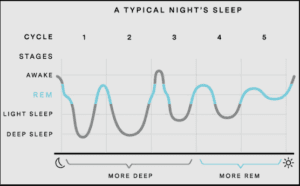
Night terrors are very different from nightmares. Night terrors occur during the Deep Sleep phase, they have very little story line and are poorly recalled after awakening. A child may cry out or sit up or flail about during a night terror, but they are not even awake while the night terror is occurring. If they do awaken they are often groggy and disoriented. Night terrors typically occur within the first hour or two of falling asleep.
Nightmares are bad dreams that typically occur in the latter half of the night during REM sleep. There is usually some kind of story line with frightening images that can be easily recalled when awake. I have noticed that all dreams, good or bad, typically contain elements from the day before but they are often mixed together in new and creative ways.
What Causes Nightmares in Children?
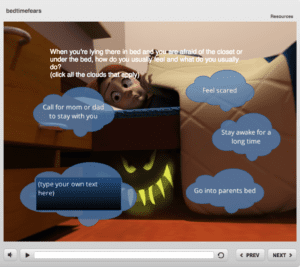
Almost all nightmares are triggered by recent events, stories, internet or TV images, or even frightening thoughts or nightmares from the day before.
Furthermore, the thing that triggered your child’s nightmares may also trigger other common fears such as:
- Fear of being alone
- Fear of the dark
- Fear of the closet or under the bed
- Fear of sounds in the house
- Fear of someone breaking in
- Fear of bad dreams or scary stories
- Fear of waking in the night
All of this results in one thing - disturbed sleep for your child and you.
The Usual Advice (with my comments)
When I searched the Internet I found the following strategies for dealing with nightmares:
- Reassure your child that everything is ok and that they are safe. - Good, but this is often not enough to really change things.
- Make sure they get enough sleep. - Yes, but how do they get enough sleep if their fears are waking them up?
- Have a light and happy bedtime routine. Avoid upsetting material (e.g., books, TV, internet videos) before bed. - Good prevention advice, but doesn’t correct an existing nightmare problem.
- Avoid leaving bright lights on, but a night light is ok. - I agree, but does not correct the problem.
- Build self-confidence. - Good, but how?
- Use positive reinforcement or rewards. - Usually ineffective for clearing up nightmares.
- Have a regular bedtime routine. - Good advice, but does not eliminate the fears.
- Talk with your child to identify things that upset them during the day. - Great, but this may not go far enough. Giving your child the chance to talk about what happened may help to resolve their anxiety, but other desensitization and confidence-building strategies could help.
What Your Child Really Needs
Your child needs a way to think differently about the nightmare, so that it is no longer scary. Furthermore, since the nightmare is like a movie that they created inside their head, they are the only one who can change it. That’s why all external interventions, such as reassurance, etc, are often not effective.
I point out to children that they, in fact, are the director of the movie that they created inside their head and, therefore, they can make up a new ending for that movie .. preferably a funny ending. Then they can play through that new funny movie at bedtime. Mom or Dad can participate but not take the lead.
Getting your child on board with this strategy can be tricky, so I developed the interactive Bedtime Hero program that takes your child through the same step-by-step therapy method that I use in my office.
The Bedtime Hero Program
Bedtime Hero is an interactive online therapy program in which my voice guides your child through a series of steps with Disney-like animations. Your role is to assist and support your child as they work through the process.
Bedtime Hero uses the same series of therapeutic steps that I use with children in my office. My clinical research revealed that over 90% of my child patients with bedtime anxiety achieved significant improvement within a few sessions using this method.
The Bedtime Hero program ..
- First asks a child to identify what usually happens and helps them reach a decision to solve the problem,
- Establishes the idea that feeling strong and confident is the best way to achieve their goal,
- Creates their personal power phrase,
- Helps them blend in good memories into their experience of being alone in bed,
- Gives suggestions on ways they can think differently about their nightmares and sleeping alone,
- Engages them in mental rehearsals of nightmares with a funny ending,
- Helps your child work through and resolve some or all of the 7 common fears,
- Allows your child to measure their level of anxiety on a reference scale of 0 to 10,
- Encourages you and your child to work through the issues bit by bit over several sessions until they solve the problem,
- Finishes with a final session that locks in their gains with an extra boost of strength and confidence,
- The program works best for children aged 6 to 12 years.
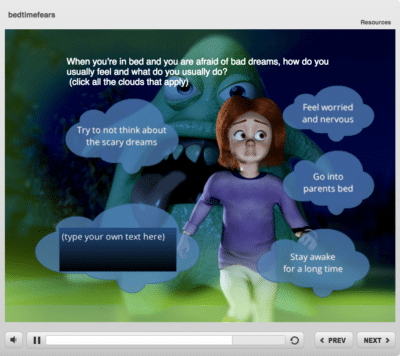
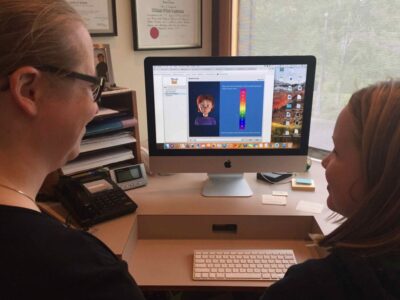
The key to this program is that it engages your child in actively solving the problem themselves. They become invested in the process and own their success. When an idea comes from within your child it has a much stronger effect than any idea coming from a grownup.
Sign Up Now
to Receive Your Free
QuickStart Email Series for Parents
PLUS
Your Free Access to
the Bedtime Hero Program
* Your email address will not be shared with anyone.
"This has been the best and most helpful tool yet with my 8 year old and her sleep anxiety. Appreciate it so much."
- Bedtime Hero Mom
Learn more about the Bedtime Hero online therapy program ..
About Dr Lauderdale

Copyright © 2024 by W. Mark Lauderdale MD FRCPC
All rights reserved.
References
- Danielle Pacheco, Medically reviewed by Dr. Anis Rehman, Nightmares in Children 2005 Sleep Foundation: 2021 June 24
- Patrick McNamara PhD Children’s Dreams and Nightmares Psychology Today 2016 Oct 30.
- Melisa Moore, MA; David Allison, MD; and Carol L. Rosen, MD A Review of Pediatric Nonrespiratory Sleep Disorders Chest Journal 2006 Oct; 130(4): 1252-1262.